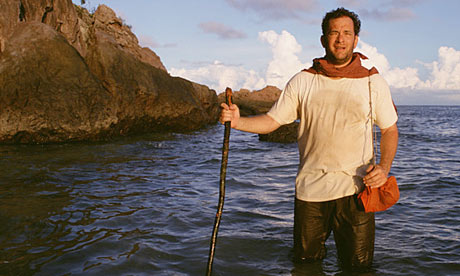Cast Away stars Tom Hanks as Chuck, a FedEx employee who travels worldwide to check in on FedEx’s global facilities. During one of his business trips, Chuck’s plane crashes and he must survive alone on a deserted island.
Chuck lives by the motto “never lose track of time”. Time
rules his life and governs his every decision. It is the reason for the success
of his business, and his job is to make sure everyone in the company is using
their time effectively and efficiently. The importance of time in Chuck’s life
is stressed during his Christmas holidays when he is called away to work. The
look of dread that crosses the face of Chuck and his girlfriend Kelly when his
pager goes off during Christmas dinner signifies time’s role in Chuck’s life.
The gifts exchanged by Chuck and Kelly reflect this; Chuck receives a pocket
watch and Kelly a pager. After he is stranded on the island, time becomes less
important and is made secondary to survival. However, time is still shown to
have an impact on Chuck’s life with Chuck’s calendar. This calendar is
essential to Chuck’s departure from the island as he is able to plot the
patterns of the tides and winds and discover the optimal time to plan his
escape. Even after he is rescued, Chuck finds that his life is no longer the
same. His girlfriend has moved on, his friend’s wife has died and his life has
become a victim to the passing time. The role of time is stressed throughout
the film, and emphasizes that people are all slaves to time.

The scene that stood out the most to me was the airplane
crash scene. The film doesn’t simply cut from the start of the crash to the
aftermath; rather, the audience is given a full view of the events that
transpire. The dangers continue to build up throughout the scene, from the
falling luggage to the watery crash itself. The life-raft is then caught on
plane fuselage, and once it is free it is steered into the path of a plane
propeller. Chuck survives danger after danger, and by the end he can barely
keep consciousness. My favourite moment of the film was the transition from the
storm to the morning after. Chuck is safe from the immediate danger of the
crash, and is laying exhausted in the life-raft. The scene transitions with
blinking black screens to signify Chuck’s eyes as he slowly loses consciousness
due to exhaustion. As he slowly passes out, the black screens become more
frequent until they finally overtake the scene, and suddenly it is the morning
after.

I will admit that I am torn with the last quarter of the
film that depicts the events after Chuck’s escape from the island. The film
goes an unusual route after the emotional high of the film, and delves into the
events that transpire after Chuck’s rescue. Chuck has been rescued and is back
in civilization, but that does not mean his story ends. I like that the film
continued after his rescue, showing how Chuck’s disappearance affected his
friends and family, and how things can’t simply go back to how they were before
the accident. This unique look differs from most films; typically the
protagonist is given a happy ending after his emotional ordeal, and the movie
ends. This would have culminated with Chuck’s rescue and his re-connection with
Kelly. However, the film takes a different turn by showing Chuck will not
simply experience his expected happy ending. While I applaud the film for going
this route, I did find myself somewhat bored near the ending. The film slows
down considerably after Chuck’s rescue, and after experiencing his emotional journey
it is difficult to stay invested in the film at this point.

I will say that Tom Hanks puts on a fantastic performance as
Chuck in Cast Away. For the majority of the film, Chuck is the only character
on screen, which prevents Hanks from working off of other characters. The
introduction of Wilson the volleyball helps showcase Chuck’s descent from
rational manager to crazy island hermit, but Hanks excels in his solitary role.
He manages to turn a crazy man yelling at a forest into a fine acting display,
and the film is all the better for it.
Cody – 8/10

No comments:
Post a Comment